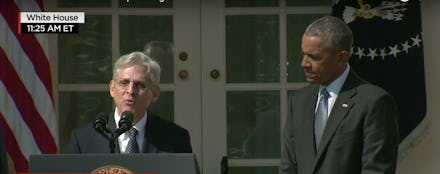Supreme Court Nominee Merrick Garland's Emotional Speech Proves It's OK for Dudes to Cry

On Wednesday, Mar. 16, President Obama held a press conference announcing his Supreme Court nominee to replace Supreme Court Justice Antonin Scalia: Judge Merrick Garland, a Chicago native and the chief judge for the United States Court of Appeals for the District of Columbia Circuit.
In a highly emotional speech, Garland thanked President Obama for the nomination, calling it the "greatest honor of my life, other than Lynn agreeing to marry me 28 years ago."
"Fidelity to the Constitution and the law has been the cornerstone of my professional life and is the hallmark of the kind of judge I have tried to be for the past 18 years," Garland said, clearly fighting back tears. "If the Senate sees fit to confirm me to the position for which I have been nominated today, I promise to continue on that course."
On Twitter, people seemed to take notice of Garland's highly (and justifiably) emotional state. But save for a few grumblings and snarky tweets from conservatives (who likely would've been opposed to Garland's nomination to begin with), the reaction to Garland's choked-up speech seemed to be largely positive, with many praising him for his apparent sensitivity:
The largely positive response to Garland's tears was a pleasant surprise, given the traditional stereotypes associated with men who openly display emotion. People have criticized, if not outright mocked, men who have shed tears in public, from former House Speaker John Boehner (who subsequently became a meme) and James Van Der Beek on Dawson's Creek (who might be the first teary dude to become a meme).
In light of our history of mocking men who cry, one would think the warm response to Garland shows we've gotten more progressive in terms of gender roles and emotion.
But really, just for men. The public response to female politicians who cry in public has been markedly different. Back in 2008, for instance, Hillary Clinton was roundly skewered when she openly wept at a campaign event in Portsmouth, New Hampshire. In an op-ed for the New York Times, Maureen Dowd described the mixed response to Clinton's tears:
Three guys [in my office] watched it over and over, drawn to the "humanized" Hillary. One reporter who covers security issues cringed. "We are at war," he said. "Is this how she'll talk to Kim Jong-il?"
Unlike the applause for Garland, the response to Clinton's tears (in the ostensibly liberal New York Times office, no less) was hostile, if not openly sexist. Remarks such as "Is this how she'll talk to Kim Jong-Il?" echo the misogynistic belief that women are too emotional and hormonally driven to hold any real political responsibility; the speaker might as well have made a joke about Clinton crying because she got her period.
Like Clinton, back in 1987, former Colorado Rep. Pat Schroeder broke down in tears during a press conference where she announced she would not be seeking the presidential nomination, a moment that she's apparently still asked about to this day.
"I want to say, 'Wait a minute, we are talking about 20 years ago.' It's like I ruined their lives, 20 years ago, with three seconds of catching my breath," she told USA Today.
On the other hand, when women don't show enough emotion, they're chastised as well. Clinton has been fighting accusations of being too rehearsed and robotic for years, and a Women's Campaign Forum study from 2010 showed that female politicians who are criticized for being "mean" or "ice queens" experience drops in their approval ratings.
Given the plethora of double standards and cultural stereotypes that men and women have to grapple with, it's not exactly surprising that Garland would be lauded for showing emotion, while Clinton would be chastised. But it clearly demonstrates that when it comes to showing emotion, women (particularly powerful women) are still damned if they do, damned if they don't.